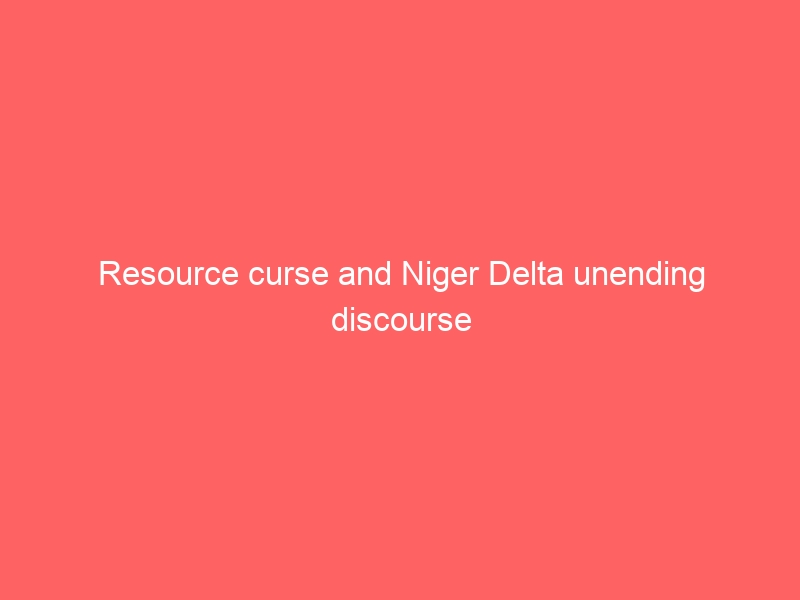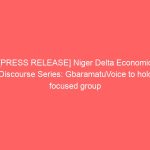Resource curse and Niger Delta unending discourse
By Jerome-Mario Chijioke Utomi
Gong by information at the public domain, a Warri , Delta state based Newspaper, GbaramatuVoice, in furtherance of its Niger Delta Economic Discourse Series, will on Tuesday, November 29, 2022 by 10am, at the BON Hotel, Warri, Delta state, hold a focused group discussion that centers on two separate but related typical and topical issues – the recently extended Presidential Amnesty Programme and Federal Government Proposed but abandoned Modular Refineries in the region.
The dialogue which has as a theme,: Presidential Amnesty Programme and Modular Refineries: Towards sustainable human capital relations”, will bring together, to deeply appraise the programmes and come up with useful recommendations, critical stakeholders comprising of Niger Delta region ex-agitators, policymakers from both state and Federal levels, agencies and commissions, development professionals, media professionals, traditional rulers from the oil producing communities, representatives of different security agencies and apparatus in the country among others.
While the Newspaper’s effort/decision to bring to the surface, major issues/ills confronting Niger Delta region to where they could be seen and treated is well understood and appreciated, it again raises the questions as to why Niger Delta region challenges have become an unending commentary that have defied every solution proffered in recent past by individuals, specialized groups and professionals? Is it not an absurdity of the sort that instead of shared prosperity and national cohesion, oil has brought Nigeria conflict and poverty, inequality and oppression, dependency, recurrent economic recession, and environmental dilapidation? How do we explain the fact that despite the abundance of oil and gas, hydro and energy resources, guarantees for the most part, Nigerians live in darkness, and businesses atrophy for lack of power supply?
Is the Niger Delta region situation a case of resource curse (Dutch Disease), also known as the paradox of plenty or the poverty paradox, where countries with an abundance of natural resources having less economic growth, less democracy, or worse development outcomes than countries with fewer natural resources?
Indeed, there are many reasons why the above questions/fears cannot be described as unfounded.
Very fundamental, Like other News and development focused organizations, GbaramatuVoice has in the past through its Niger Delta Economic Discourse Series, facilitated research, publications, and partner relevant agencies of government and private sector on issues that are critical to the development of the oil-rich Nigeria’s Niger Delta region. Yet, none of the policymakers in the country articulated such recommendations in their national or state policy frameworks.
Again, aside from dwelling in details on sustainable actions that could consistently be taken by the Federal Government and other interventionist agencies to project Niger Delta region in good light, some agencies particularly Non Governmental Organizations (NGO) have in recent times provided platforms for all to ventilate their concerns about the now extended Presidential Amnesty Programme as well as the Federal Government proposed modular refineries to be sited in the Niger Delta region. Other Niger Deltans with critical interests have also at one time or the other offered road maps for restoring the health and vitality of the Niger Delta region and particularly proposed strategies for sustainable development, empowerment and reintroduction/re integration of the youths of the region to their proper pride of place.
But successive administrations in the country viewed these propositions as a prank.
Regrettably, failure to adjust, adapt and incorporate these calls by the nation’s policy makers have characterized the region, in the estimation of the watching world, as an ‘unfinished project’, worse than a ‘work-in-progress’. This has gone so bad that even at 62, no nation best typifies a country in dire need of peace and social cohesion among her various sociopolitical groups than Nigeria. Over the years, myriads of sociopolitical contradictions have conspired directly and indirectly to give the unenviable tag of a country in constant search of social harmony, justice, equity, equality, and peace.
Today, the petroleum sector without going into specifics doubles as a centre for the primitive accumulation of wealth as well as a platform for petro-rentier crimes. Within this sector, petroleum rents have been the object of an opportunistic scramble by corrupt political elites and their counterparts. In effect, the significance of oil wealth in Nigeria has been contradictory: it has been a blessing as well as a curse, by generating both revenue and criminality.
This pain visited on the Niger Delta and the nation as a whole is deepened by the fact that it was avoidable.
Making the above awareness a crisis is the report that there are huge solid mineral deposits across the length and breadth of the country, yet Nigeria depends 95% on oil income for foreign exchange earnings. Every part of the country is blessed with immense agricultural potentials, yet the vast majority of our youths remain unemployed, while we spend billions annually importing food staples and industrial raw materials. We are quick to boast of a huge population. It is true that one-in-every-four-black-persons in the world may be Nigerian, but a significant number are more of human liability than human resource.
As the nation continues to brood over the above revelations, the truth must be told to the fact that the current challenge was heightened by the nation’s refusal to learn from history which continues to teach humanity invaluable lessons about life.
To move forward, the present administration must recognize that any personality who wants to grow in leadership must almost always scale and be open to learning. They must be molded by new experiences to improve their leadership.
Most importantly, even as stakeholders will at the meeting put together GbaramatuVoice highlight in details urgent steps needed to support through training, financing and other technical equipment, of operators of modular refineries in the region particularly, as available evidence has shown that most of their refined products assures more quality assurance when compared with products refined abroad, this piece believes and still believes that President Muhammadu Buhari’s led Federal Government must articulate for consideration modalities for revamping the nation’s refineries.”
This must be done not for political reasons but because Nigeria’s Vice President, Professor Yemi Osinbajo at the GbaramatuVoice Newspaper’s 6th Anniversary Lecture/Niger Delta Awards among other remarks, told the gathering that Federal Government is determined to see through the completion of all the critical projects that had been embarked upon in the Niger region.
In his words, “we have invested significantly in the Niger Delta as the region that holds the energy resources that have powered our progress for six decades as well as the keys to an emergent gas economy. In 2017, following my tour of the Niger Delta, which involved extensive consultations with key stakeholders in the region, the New Vision for the Niger Delta was birthed in response to the various challenges which had been plaguing our people. The objective of this New Vision is to ensure that the people of the region benefit maximally from their wealth, through promoting infrastructural developments, environmental remediation and local content development.”
Without doubt, the above point appears welcoming, but, again, the truth must be said to the effect that the people of the region are particularly not happy with the paltry three per cent allocation to host communities by the Petroleum Industry new Act(PIA).
In the interim, this piece applauds Gbaramatuvoice for keeping the flag on Niger Delta discourse flying.
- Utomi Jerome-Mario is the Programme Coordinator (Media and Policy), Social and Economic Justice Advocacy (SEJA), Lagos. He could be reached via: jeromeutomi@yahoo.com/08032725374












